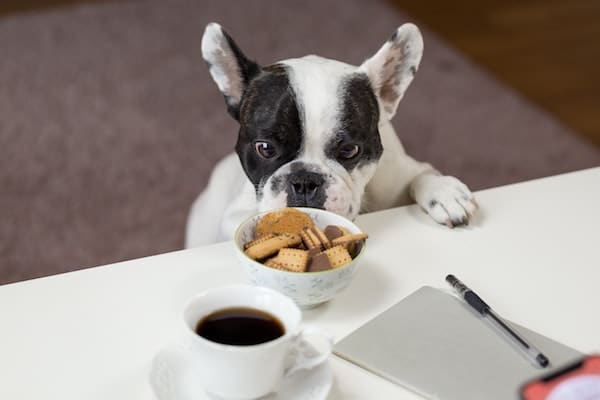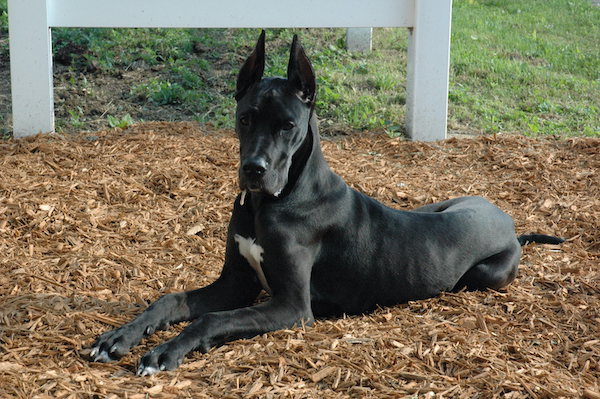If you want to share your meal or snack with your dog, you must first be sure that the food is safe for him or her to eat. This article will help you determine what commonly eaten foods are safe for dogs.
Keep in mind that eating the wrong food can have very serious consequences, so it very important to check before feeding your dog human food.

What Human Foods Can My Dog Eat?
The following foods are safe for most dogs to consume in small amounts:
- Apples are a healthy snack for dogs as long as the core, seeds, and stem are removed according to the American Kennel Club. It is recommended that apples be served in small, easy to chew pieces to prevent choking.
- Bananas are safe to serve to canine companions according to the American Kennel Club. A favorite of many dogs, bananas should always be served without the peel.
- Blueberries may be offered to dogs according to the American Kennel Club. They are a healthy low-calorie snack. Freeze in ice cubes for a healthy and tasty summer snack.
- Carrots may be fed to dogs according to Purina. Carrots are a healthy snack and may support dental health.
- Cheese may be offered in small amounts according to Modern Dog Magazine, but keep in mind that a moderate amount may cause digestive upset. If you would like your dog to enjoy cheese without the potential for digestive upset, try a Himalayan cheese chew treat.
- Corn is safe for dogs according to the American Kennel Club, and it is actually a common ingredient in commercial dog food. However, dogs should never be fed corn on the cob. Many dogs will attempt to eat the cob, which will cause a blockage potentially requiring surgical removal. Dogs may also have plain, unsalted, unbuttered popcorn.
- Eggs may be fed to dogs as long as they are fully cooked according to Purina. Eggs are an ideal healthy snack for dogs.
- Green beans are a healthy snack for dogs according to the American Kennel Club. This low-calorie snack can actually be added to a dog’s meals to help him feel fuller while reducing the kibble he is offered as a part of a plan to reach a healthy weight.
- Oatmeal, prepared with water instead of milk, plain with no added sugars or spices, fully cooked, may be fed to dogs according to the American Kennel Club.
- Peanut butter may be fed according to ASPCA Pet Insurance, however, it is crucial to search for the ingredient xylitol on the label before feeding this snack.
- Plain bread may be offered in small amounts according to the American Kennel Club, but be sure to avoid raisin bread, as raisins are toxic to dogs.
- Rice may be fed to dogs according to the American Kennel Club. When offering your dog rice, it should be plain white rice. If your dog is a diabetic consult with your veterinarian before serving.
- Salmon may be served in small amounts on occasion according to the American Kennel Club. Salmon is also used in commercial foods for dogs with food sensitivities.
- Strawberries are a healthy snack for dogs according to the American Kennel Club. Be sure to only serve fresh or frozen plain strawberries; avoid canned, sweetened or syrup-ed varieties of strawberries. Frozen strawberries make a great summer snack for dogs.
- Turkey, prepared plain and served without fat or skin, may be fed to dogs according to Trupanion. Turkey is actually used in commercial dog food occasionally. However, dogs should never be given turkey bones.
- Yogurt may be offered in small amounts, such as allowing your dog to lick a yogurt cup clean after you have eaten it, according to the American Kennel Club. However, be sure to read the label before serving it, as some yogurts contain xylitol.
Are Any Human Foods Good For Settling My Dog’s Stomach?
If your dog is suffering from digestive upset, you may feed what most veterinarians refer to as the “bland meal”: plain baked chicken, plain white rice, and plain green beans.
Be sure to consult with your veterinarian before feeding this meal, as dogs with certain medical conditions are less tolerable of it.
Also, this is not a meal you would want to serve daily as a homemade diet. Should you want to feed your dog homemade meals, consult with your veterinarian or a canine nutritionist.
What Human Foods Are Not Safe for My Dog?

Avoid offering your dog any of the below foods, and be sure to keep these foods out of your his or her reach:
- Alcohol is not safe for dogs. According to Hills Pet, alcohol is poisonous and can cause death.
- Caffeine is toxic to dogs according to Pet Poison Helpline. If your dog eats a moderate amount of coffee, soda, tea, or another source of caffeine, you should seek veterinary assistance promptly.
- Chocolate is probably the one thing that almost everyone knows dogs cannot have. However, what most people do not know is that symptoms of chocolate toxicity may not present for six to twelve hours! If your dog eats chocolate but initially appears to be fine, take advantage of catching it early and rush to your veterinarian. The American Kennel Club offers instructions for when dogs consume chocolate here.
- Grapes and raisins are incredibly toxic to dogs according to Purina. The consumption of grapes or raisins leads to kidney failure, so be sure to act fast if your dog eats either.
- Macadamia nuts are toxic to dogs according to the Merck Veterinary Manual.
- Marijuana is toxic for dogs according to VCA animal hospitals. Be sure to keep all edibles and all other forms of marijuana out of your dog’s reach.
- Milk and dairy products are enjoyed by many dogs, but it is important that these items are offered in moderation according to the American Kennel Club. While most dogs can tolerate a small taste of cheese, know that most dogs are lactose intolerant and will experience digestive upset if they consume even a moderate amount of dairy products.
- Onions in all forms are very dangerous for dogs to consume; according to the American Kennel Club, onions break down dog’s red blood cells.
- Raw meat diets have become popular among dog owners who favor natural care in recent years. However, feeding raw meat comes with the risk of your dog and your family contracting foodborne illnesses. Further, dogs are better able to digest cooked meat according to Purina.
- Raw yeast dough is extremely toxic to dogs according to Trupanion Pet Medical Insurance. Yeast will expand in your dog’s stomach, causing bloat, and when their bloodstream absorbs it, they experience alcohol poisoning.
- Xylitol, a sugar substitute, is very toxic to dogs even in small amounts according to VCA animal hospital.
What Should I Do If My Dog Ate Something Dangerous?
Immediately contact your dog’s veterinarian. If this occurs after your normal veterinarian’s operating hours, immediately contact the closest emergency veterinarian to your home or the ASPCA Poison Control Hotline. If your dog is showing concerning symptoms, it is best to rush to the emergency veterinarian right away and call once you are in the car to let them know that you are coming.
Conclusion
Nearly all dogs are notorious for looking pitiful while their humans eat a meal or snack, hoping a bite will be shared with them. However, dogs do not know what is safe or unsafe for them to eat, so it is up to their owners to protect them by keeping dangerous food out of their menus.
If your dog accidentally ingests something from the unsafe foods list, or a food item you are unsure about, contact your veterinarian immediately.
Save It For Later





